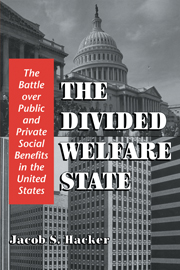Book contents
- Frontmatter
- Contents
- List of Tables
- List of Figures
- Preface
- Part I The American Welfare Regime
- Introduction: American Exceptionalism Revisited
- 1 The Politics of Public and Private Social Benefits
- Part II The Politics of Public and Private Pensions
- Part III The Politics of Public and Private Health Insurance
- Part IV The Formation and Future of the American Welfare Regime
- Appendix
- Notes
- Index
Introduction: American Exceptionalism Revisited
Published online by Cambridge University Press: 05 June 2012
- Frontmatter
- Contents
- List of Tables
- List of Figures
- Preface
- Part I The American Welfare Regime
- Introduction: American Exceptionalism Revisited
- 1 The Politics of Public and Private Social Benefits
- Part II The Politics of Public and Private Pensions
- Part III The Politics of Public and Private Health Insurance
- Part IV The Formation and Future of the American Welfare Regime
- Appendix
- Notes
- Index
Summary
After suffering from debilitating headaches for nearly a year, Keeshun Lurk was diagnosed with cancer in 1999. In a sense, he was lucky. Because he was uninsured, he had bounced from the emergency room to the free clinic and back for months, his life-threatening condition undiagnosed, his only real treatment over-the-counter pain medications. Fortunately, one of his neighbors, a consumer activist, had pressed his case, setting in motion the visits and tests that uncovered his illness. It was an irony of Lurk's plight that he was now so disabled that he qualified for public medical assistance. But that was not the only cruel twist of fate. Lurk was a hospital employee – a temporary “floater” ineligible for health benefits – and the hospital for which he worked was in the heart of the nation's capital. Lurk lived, in fact, just three miles from the domed Capitol building where, in the summer of 1999, Congress was battling over a “Patients' Bill of Rights” for the privately insured, having failed five years earlier to extend coverage to the more than 40 million other Americans who, like Lurk, lack employment-based insurance.
The Patients' Bill of Rights was not the only issue before Congress in 1999. As Lurk began chemotherapy, another worker – older and better off, yet facing his own predicament – explained to a Senate committee how his employer of twenty-eight years had revamped the company retirement plan, depriving him of more than $400,000 in expected benefits.
- Type
- Chapter
- Information
- The Divided Welfare StateThe Battle over Public and Private Social Benefits in the United States, pp. 5 - 27Publisher: Cambridge University PressPrint publication year: 2002

